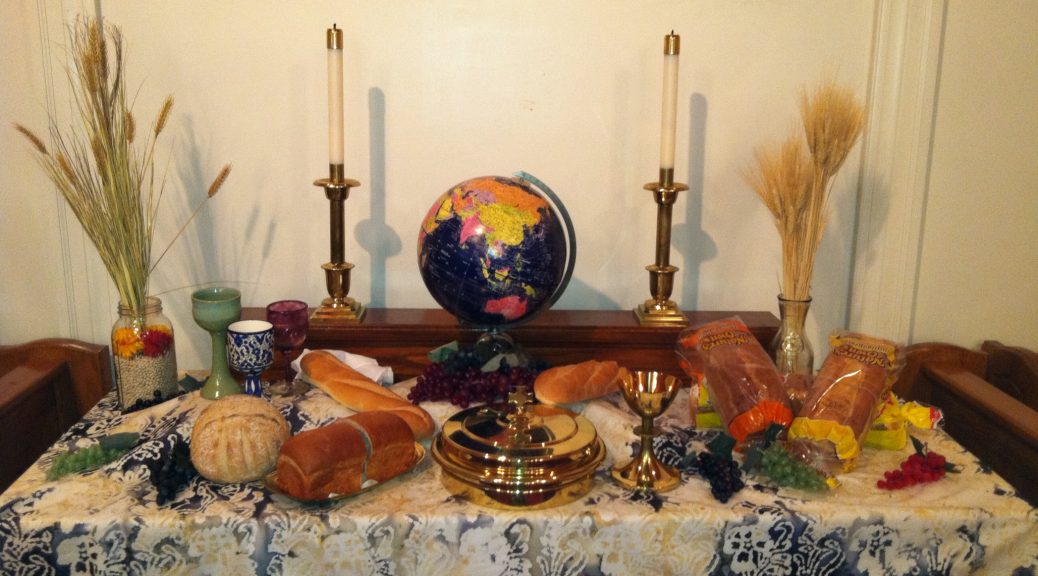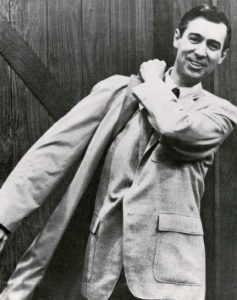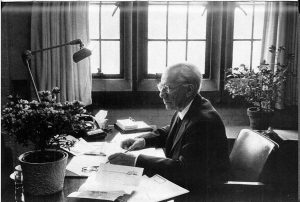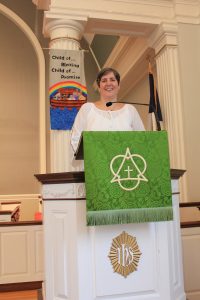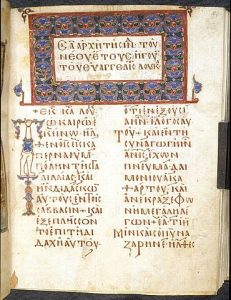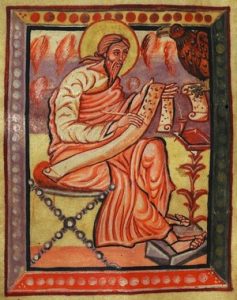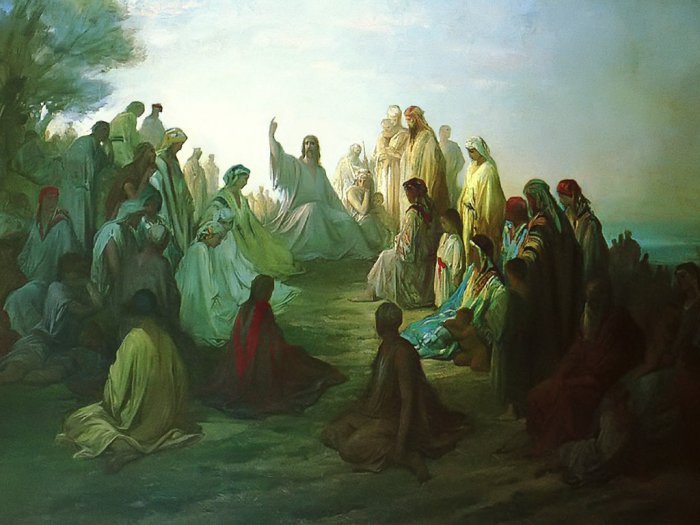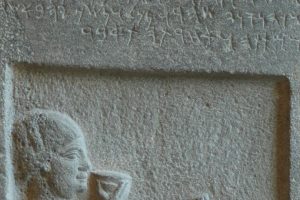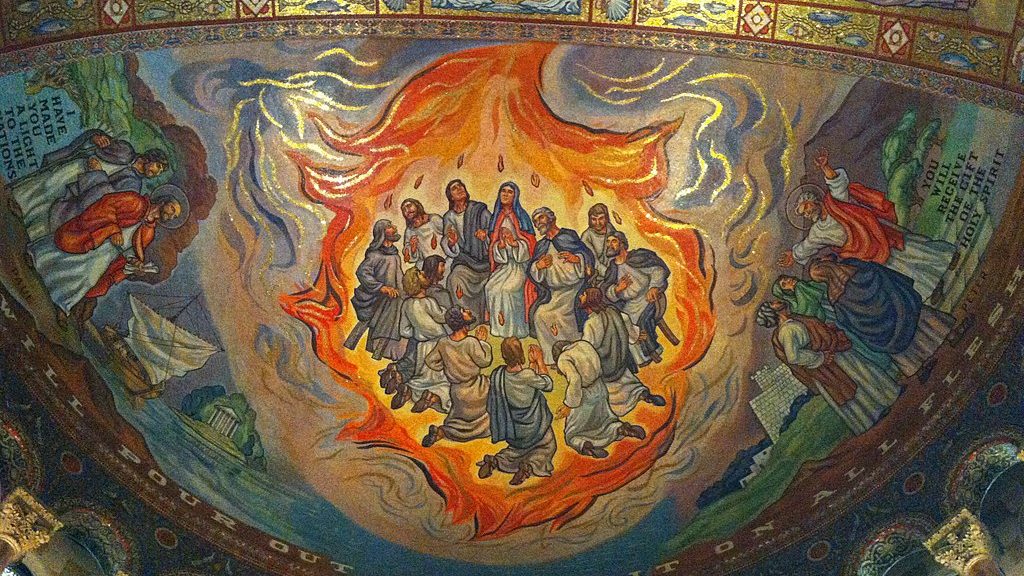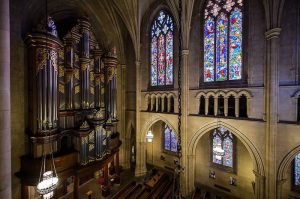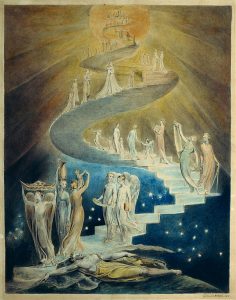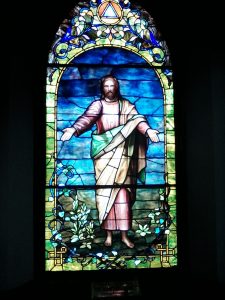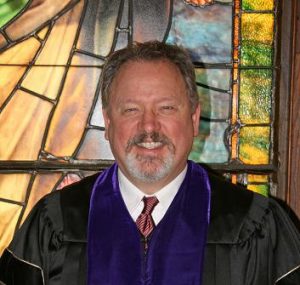
Snapshot: God is Still Speaking, but are we listening? Or have we been somewhat ‘hard of hearing’?
Plus, three important examples of how U.C.C. has been at the forefront during its history (and ours). Read on…
As people enter into old age, they say that one of the most difficult aspects of it is hearing loss. I watched as this happened to my Dad. He became quite hard of hearing in his latter years, and then almost completely deaf toward the end.
It’s isolating. When one doesn’t pick up on what everyone else is saying, you feel out of it, not part of the group, and it’s frustrating.
So the family tried, with some success, to always make sure Dad not only was included, but felt included, by speaking loudly and directly.
But despite some of the problems, there is also a lighter side to being hard of hearing.
As you know, we’ve lived on the West Side of Binghamton for nearly 30 years. The homes there are nice, but the properties are quite small. It doesn’t even take me 5 minutes to cut the grass. There are lots of fences in the neighborhood, and we’re all packed in pretty closely.
As well, from many past sermon references, you know that we have a hot tub, which Dad bought for us for an anniversary.
So one time when the parents were visiting, early one morning, as the pre-dawn* light was beginning to filer through the trees, Dad and I are enjoying a soak in the hot tub.

In my neighbor’s yard there is a tree, where on one particular branch I have seen squirrels mating several times.
It seems to be their favorite spot, this one branch. Squirrels, it seems, prefer early morning lovemaking.
So to make conversation, I say to my Dad, “Dad, that branch over there, that’s where the squirrels have sex.”
He says, “What?”
I say, “That branch over there, that’s where squirrels have sex.”
He says, “What?”
Finally, I say, “THAT BRANCH (pointing to it) IS WHERE SQUIRRELS HAVE SEX!”
He turns and looks at the branch, when we hear a voice from the neighbor’s yard asking, “What branch?”
God Is Still Speaking … Keep Listening.
As we know and love, the motto of the United Church of Christ is “Got is Still Speaking.” And I’ve been trying to delve into and expand upon this theme in a number of recent sermons.
In my opinion, that motto is one of our crown jewels. And I don’t think it has dawned fully upon the denomination, let alone the greater Church, how valuable that jewel really is.
That motto came into being after a quip by Gracie Allen, of the George Burns and Gracie Allen comedy team of the 1950’s, where she said, “Never place a period where God has placed a comma.”
It’s a great piece of advice, and a fine sentiment, but it in turn creates a disconcerting and nontrivial problem for us. How do we discern the voice of God?
So applying my finest scholarship, I did what any good intellectual would do: I Googled it.
I typed in “Sermons on how to discern the voice of God.” And guess what I got?
Lots of sermons mostly about Samuel, some about Moses, some about Elijah, (all of whom spoke directly with God), but I didn’t find them helpful.
I wanted to find some practical advice, not just biblical examples, on that otherwise weighty question, “How do we discern the voice of God?”
After all, what good is it that God is still speaking, if we can’t get the difference between that and the background noise?
Given that, here’s what I recommend.
There are three sentences in the Bible which in my mind are more like equations than sentences, where one thing “is” or “equals” the other thing. They are:
~ God is Spirit. (John 4:24)
~ God is Love. (I John 4:16)
~ God is the Way, Truth, and Life. (John 14:6)
So here’s the rule:
That communication from God (or at least what you suspect is God), regardless of form, promotes the thing that God equals — Spirit, Love, your Path, the Truth, and Life?
Regardless of form, communication with God invariably, consistently, and without exception, promotes your Path, advances Truth, enhances Life, nourishes Spirit, and is Loving rather than fearful or angry or divisive.
If it is at all true that the Atman, the Spark of Divinity, the Divine Spirit, is found in everyone, rather than in a separate entity on a throne in heaven, it follow then that communication from the divine would be equally broad and expansive, and of countless varieties.
It might take the form of an innermost thought or feeling, something someone else said to you, something you read, something on the radio, or a various other forms.
It could, then, take the form of songs, readings, things said by a friend or confidant; other Gospels beyond Matthew, Mark, Luke, and John, such as the Gospel of Thomas, or Philip, or Mary.
It could take the form of what contemporary spiritual teachers are saying and writing, which is exactly what our present scriptures were 2000 years ago.
Could it take the form as well of Scientific literature, literature that advances truth, like what might be found in the Journal of the AMA, or the journal Nature?
Could God be speaking in any of several documents that many feel are dictated by God, such as A Course in Miracles, or Conversations with God?
But most commonly, could God be communicating with inner feelings, thoughts, urges, and images, or intuition? Sometimes it pops into your head that you really should call so-and-so, and you do, and after the conversation you realize how perfectly timed and appropriate the call was.
In my Wednesday night class a couple of weeks ago, someone asked this question:
Why is it, if we are indeed all linked together spiritually, that some people seem more spiritually advanced while others seem to be so warlike, exhibiting involved behavior?
Good question!
While we were pondering the question, another person told us of an image that had just at that moment formed in her mind.

It was an image of a flowering meadow.
Myriad flowers, but each of them opening in their own time. Some of the flowers open quickly and fully, while others are still in the bud stage. Yet all of them comprise the meadow.
What a beautiful answer! What a Godly answer!
Even more importantly, it was an answer that promoted our Path, advanced the Truth, enhanced Life, nourished Spirit, and was Loving rather than fearful, angry, or divisive.
Spiritual Leaders, Ahead of Their Time
This is my last sermon with you, and I have to mention the thing I am most proud of in the United Church of Christ.
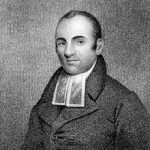 1785 – Lemuel Haynes was ordained. Seventy-five years prior to the Civil War, our spiritual ancestors ordained the first black man to serve a church on the North American continent.
1785 – Lemuel Haynes was ordained. Seventy-five years prior to the Civil War, our spiritual ancestors ordained the first black man to serve a church on the North American continent.
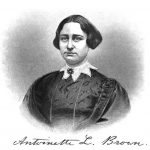 1853 – Antoinette Brown was ordained. Our spiritual ancestors ordained the first woman to serve a church on the North American continent, 110 years prior to the Feminist Movement of the 1960’s.
1853 – Antoinette Brown was ordained. Our spiritual ancestors ordained the first woman to serve a church on the North American continent, 110 years prior to the Feminist Movement of the 1960’s.
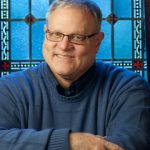 1972 – William Johnson was ordained. What may be 100 years prior to general acceptance — may it not take that long! — our spiritual ancestors ordained the first openly gay man to serve a church on the North American continent.
1972 – William Johnson was ordained. What may be 100 years prior to general acceptance — may it not take that long! — our spiritual ancestors ordained the first openly gay man to serve a church on the North American continent.
Why did they do that?
Why did our United Church of Christ (U.C.C.) spiritual ancestors ordain Lemual Haynes, a black man; Antoinette Brown, a woman; and William Johnson, a gay man, well before the wave to do so?
It had to have been incredibly unpopular, deeply problematic, and would have been ever so costly.
Ponder that last one for a minute.
What would that have been like to ordain a gay man in the early 1970’s? Many of us are old enough to remember the abhorrence and repulsion our culture had for homosexuals at that time. So why did they do it?
I suggest to you that all of these things were done because our spiritual ancestors heard something — they heard a message, discerned a subtext, that was the guiding of the Spirit.
What I think they heard, somehow more clearly than before, is that we are all essentially spiritual beings made in the image of God.
They heard that we are primarily and essentially not just bodies, but Spirit.
As Pierre Teilhard du Chardin once said, “We are not humans having a spiritual experience; we are spirits having a human experience.”
If we are hearing God correctly, and clearly, we then realize that it is our spirit that matters, and little else.
It doesn’t matter how much melanin pigment is found in our skin cells; nor does it matter if our genome contains an XX or an XY chromosome.
It doesn’t matter as well what of the dozens of other preferences our physical body might have.
It is the soul of a person that matters. Our spiritual ancestors may not have worded it that way, but that is what I think they heard.
The Second Point: What If …
The second point is something that makes me feel wistful; I have a feeling of sadness to think about what might have been.
Ponder for a moment if the Church — that is, the Church Universal, with a capital “C” — had listened to our spiritual ancestors, and that the Church would then have led the culture toward recognizing the spiritual equality of blacks, beginning with the ordination of Lemuel Haynes in the 1780’s; recognizing the spiritual equality of women beginning with the ordination of Antoinette Brown in the 1850’s; and recognizing the spiritual equality of gays and lesbians beginning with the ordination of William Johnson in the early 1970’s:
What if, in our thought experiment, the Church had led the culture rather than holding it back?
Alas.
Despite what might have been, I am so glad, and proud, that our United Church of Christ spiritual ancestors were listening, and heard, a Word from the Most High, such that even though their actions would take a century to take hold, they got it started none the less.
Our Task in the Here and Now
Our task now is to open our minds and hearts to the idea that God is verbose. not just 2,000 years ago. Not just now and then through the centuries. But continually — Spirit, communing with spirit, a flow of thought, images, feelings of compassion, kindness, guidance, and love.
A number of years ago, my parents have been visiting in the Autumn, and with the cold weather looming, it was time to take them back to their home in the South.
With the car all packed, one afternoon on a bright, clear day, we headed South. We were in the Harrisburg area at dusk, and there was a gorgeous sunset in the West that day.
Mom was riding shotgun, and Dad was in the back seat behind her. mom was looking out the window at the sunset, taking it all in. She turned, and said to Dad, “Al, look at the beautiful sunset.”
He said, “What?”
“Al, look at the sunset.”
“He leaned forward and said, “What?”
She said for a third time, bur really no louder, “Look at the sunset.”
Dad sat back and said nothing. He still didn’t hear her. I looked at him in the rearview mirror. He was crossing his arms. He was mad and frustrated. I looked at Mom, and she too had a scowl on her face.
At the time, I was trying to figure out what to do. Do I tell Mom to try one more time, I wondered? Do I tell Dad to look at the sunset?

My mind was racing, when I saw Dad look out the window and take note of the beautiful sunset.
He watched for a moment, and then tapped Mom on the shoulder, and said to her, “Honey, look at the beautiful sunset.”
She turned towards him and said, “What?”
That, my friends, is humanity listening to God!
But notice: They both saw the beautiful sunset, and despite the communication issues, they loved each other all the more deeply.
Consider This…
Beyond the idea of “God is Still Speaking; beyond the advice, “Never place a period where God has placed a comma,” beyond that, consider that god is always speaking, always communicating in thought, feeling, images. Always. Continual.
Consider that God is not stingy with the embrace of Love, the inner guidance or assurance, the pouring out of Spirit upon our souls to heal, forgive, guide, and simply hold close.
God is always promoting your Path, advancing Truth, enhancing Life, nourishing Spirit, and cultivating Love. Always.
Keep listening.
Amen.
Download the PDF of this sermon here.
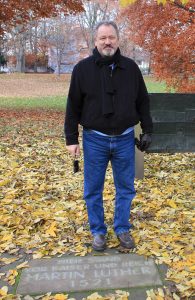
The Rev. Dr. Arthur Suggs retired from his ministry at the end of 2018. Read more in the recent edition of The Forecaster.
* We’ve used the hyphenated version of pre-dawn per the A.P. Style Guide, noting that predawn may also be used.


